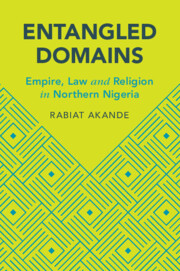Book contents
- Entangled Domains
- Cambridge Studies in Law and Society
- Entangled Domains
- Copyright page
- Dedication
- Contents
- Acknowledgments
- Note on Terms
- Introduction
- Part I Governing Faith
- Part II Constituting Difference
- Chapter Three The Construction of Minorities
- Chapter Four The Making of the 1958 Penal Code
- Chapter Five Constituting Rights
- Part III Imagining the Past
- Bibliography
- Index
- Cambridge Studies in Law and Society
Chapter Five - Constituting Rights
Christian Religious Liberty in the Late Colonial State
from Part II - Constituting Difference
Published online by Cambridge University Press: 18 May 2023
- Entangled Domains
- Cambridge Studies in Law and Society
- Entangled Domains
- Copyright page
- Dedication
- Contents
- Acknowledgments
- Note on Terms
- Introduction
- Part I Governing Faith
- Part II Constituting Difference
- Chapter Three The Construction of Minorities
- Chapter Four The Making of the 1958 Penal Code
- Chapter Five Constituting Rights
- Part III Imagining the Past
- Bibliography
- Index
- Cambridge Studies in Law and Society
Summary
This chapter chronicles the triumph of a Protestant notion of religious liberty at Independence. The Protestant victory took the form of the late colonial state's domestication of an international legal provision—Article 18 of the Universal Declaration of Human Rights. Article 18 emerged from the concerted effort of international Protestant ecumenists to protect Christianity from the ravages of secularism, manifesting in restrictions on missions in places like Northern Nigeria, among other things. Protestant ecumenists emphasized two religious liberties: the liberty of the proselytizer to preach and the target audience to convert. Further, Protestant ecumenists argued that the Protestant notion of religious liberty trumped arguments about the empire's need to be separate (or distanced) from Christian missions. By narrating the Protestant effort to neutralize a mission-hostile secularist separation with a mission-friendly notion of religious liberty, the chapter argues that these constitutional ideas take shape in specific contestations. Consequently, the chapter makes a case for apprehending these ideas by closely studying the struggles that galvanize them.
Keywords
- Type
- Chapter
- Information
- Entangled DomainsEmpire, Law and Religion in Northern Nigeria, pp. 189 - 226Publisher: Cambridge University PressPrint publication year: 2023

